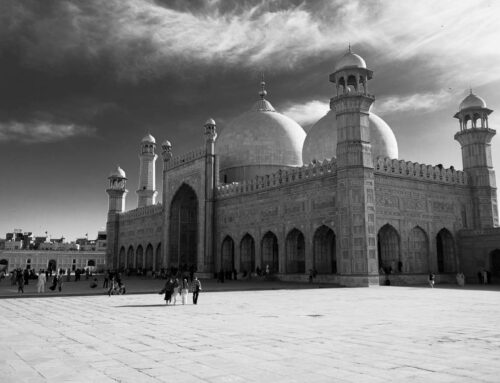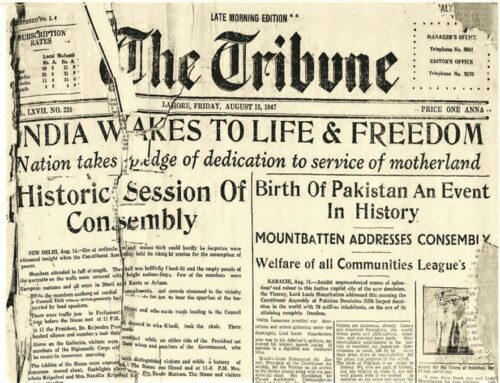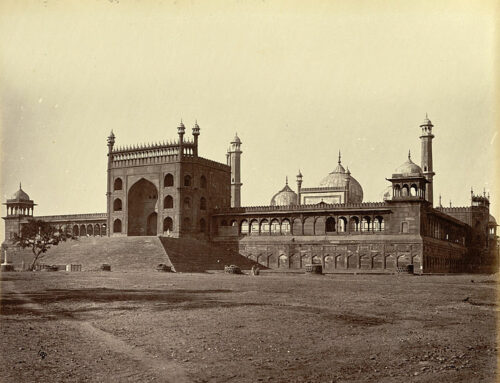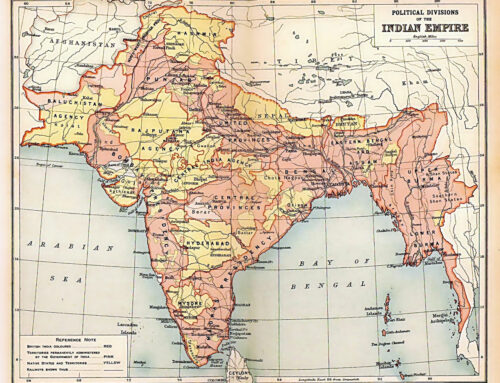Translator’s note: The following is a translation of Mufti Muhammad Taqi Usmani’s article “Islam awr Riasat“, in which the author addresses Javed Ahmad Ghamidi’s dichotomising of religion and the state, and highlights the secularist undertones in the narrative he has attempted to construct. It is important to bear in mind that the article was written specifically in the context of Pakistan and its constitution.
The Pakistan Movement, headed by Quaid-i-Azam (Muhammad Ali Jinnah) in what was unpartitioned India at the time, was on the basis of forming a Muslim nation-state. In opposition to the British and Hindus who were in favour of deeming all Indians one nationality and forming Greater India (Akhand Bharat), Quaid-i-Azam, with great fervour and in light of evidence, proclaimed that there were two peoples, namely Muslims and non-Muslims, who inhabited India. Muslim leaders, thinkers and scholars fully supported this idea. Even today, the loud chants of: “What is the meaning of Pakistan? La ilaha illallah” which I would hear as a child, resonate in my mind. Eventually, the vast majority of Muslims responded to Quaid-i-Azam’s calls, and after presenting unforgettable sacrifices, the vision of Pakistan was realised at the foot of the Himalayas.
The concept behind the formation of Pakistan was quite evident. Despite this, however, a small group wished to deprive Pakistan of its ideological basis even after it had been formed, and expressed the notion that it should be a secular state. The first Constituent Assembly of Pakistan unanimously adopted the Objectives Resolution, which headed the country in a specific direction: Sovereignty over the entire universe was declared for Allah Almighty alone, and the chosen representatives of the people were to exercise their powers within the framework of the Quran and Sunnah. Notwithstanding a few minor alterations in the wording, this Resolution remained part and parcel of all drafts of the constitution in 1954, 1956, 1962 and 1973, and it still remains a document of our constitutional history which we are proud of.
For a quarter of a century, within the many different assemblies which came and went, and also elsewhere, it remained a topic which was very openly discussed. Eventually, the whole nation agreed to it. When the stage of forming the Constitution came, all drafts of the Constitution contained the clause that no law which opposes the Quran and Sunnah will be passed and that all current laws will be adapted accordingly. All political and religious parties agreed to the 1973 Constitution which is still in force today, and through Allah’s grace, this remains a point of consensus amongst all political parties. They wish to fully protect this, a fact confirmed by the recent historical agreement between the ruling party and the opposition. The Supreme Court also deemed it an integral component of the Constitution.
However, for some time now, certain individuals are once again giving air to the sentiment that Pakistan should be made into a secular state, to cleanse it of terrorism. In simple terms, the ideological, political and practical efforts that span over half a century to determine the correct direction for the country, should all be put on the shelf and we should go back to the drawing board. At a time when all the country’s groups are collectively resolved to overthrow the monster of terrorism, just the thought of the Pandora’s box that could be opened by altering the idea behind Pakistan’s formation and its unified direction, and the consequent dissent that could be unleashed, is frightening.
In this current climate, Javed Ahmed Ghamdi has echoed the sentiments of secularists in an apparently “religious narrative” and under the pretext of religion, published by the Daily Jang (22nd January) under the title “Islam and the State: A Counter Narrative”. Instead of stating his ideas to be propagation of secularism, he has deemed them to be a “religious counter-narrative”. What the objective of this “narrative” is has been stated right at the outset: “It is only a counter-narrative to religious thought, and not the propagation of secularism, which can correct the current state.” Despite having read the points explained in this counter-narrative many times over, I have found them to be strange in the least – perhaps owing to my own lack of understanding – and I could not find any way of reconciling between its discrepancies, despite trying hard to find some plausible explanation.
There are many points in his article which are worthy of review, but discussing all of them would be too lengthy and beyond the scope of this article. However, I feel it necessary to highlight a few of the contradictions and what lies behind them, because not only do they negate the whole concept behind Pakistan’s formation, but rather invite towards such a loose social system which has no plausible way of being applied – at least according to my deficient understanding.
In his first point, he said:
It is a totally baseless idea that the state has a religion and that there is a need to make it a Muslim state by having an Objectives Resolution and to make it constitutionally binding that no law can be passed against the Quran and Sunnah.
What this clearly means is that the Objectives Resolution in Pakistan’s constitution, or more specifically, the condition that no law will be made which opposes the Quran and Sunnah, is completely unnecessary; in fact it is a baseless notion. The fundamental concept behind the Objectives Resolution is to affirm Allah’s ultimate authority; what is the inevitable consequence of deeming the Resolution unnecessary and baseless, except affirming Allah’s authority to be likewise?
This narrative is being presented to counter or substitute the “propagation of secularism”, but it is beyond our understanding what the difference is between “propagation of secularism” and this point from the “religious narrative”? Secularism also asserts that the state has nothing to do with religion, with religion being an entirely individual matter, and that no religion can be enforced on parliament, and thus the Objectives Resolution is unnecessary; this is exactly what Ghamidi Sahib is saying. Does changing the terms change the reality?
Strangely, Ghamidi Sahib himself says under the eighth point:
The Qur’anic verse: “Their matters are through mutual consultation” (Quran, 42:38) requires that a parliament be in place and that nobody is above the parliament, be it scholars or the judiciary of the state. This principle of mutual consultation makes it binding upon every individual and organisation to submit to the decisions of parliament, even if they do not agree. In Islam, this is the only permissible method of establishing and running a state. Any state which is established contrary to this will be considered invalid.
The conclusion of both points is that the parliament will be formed under the Qur’anic command of mutual consultation, but thereafter, it cannot be stipulated that no law against the Qur’an and Sunnah should be passed. Despite this, every individual and organisation must submit to every rule passed by parliament.
At this point, the first question which arises is that if the state has no religion and parliament cannot be forced to legislate in accordance to the Qur’an and Sunnah, on what basis has the Qur’anic principle of mutual consultation been stipulated? Moreover, if the state has no connection with religion, on what basis is it claimed that “in Islam, this is the only permissible method of establishing and running a state”?
The second question is that if parliament were to pass a law allowing same-sex marriages, following suit with Western countries, does the Qur’anic principle of mutual consultation still make it “binding upon every individual and organisation to submit to the decisions of parliament, even if they do not agree”? If the answer is in the negative, then why, especially when there is no obligation upon the parliament not to pass laws that oppose the Qur’an and Sunnah?
Ghamidi Sahib goes on to say under point nine:
Amongst the obligatory rulings of Islam, only salah and zakah are such that if the communal system of the Muslims wishes to enforce them, it can do so with the power of the law.
We assume that communal system refers to the state. So does this mean that the government can make salah obligatory by law and punish those who do not perform salah? If it is really a command of the Qur’an to enforce the performance of salah by law, as Ghamidi Sahib has stated, then the clause: “if the communal order of the Muslims wishes” would mean that it is at the discretion of the government to obey this Qur’anic command; it does not have to comply if it does not want to. If this is the case, what is the meaning of the following verse of Surah Ahzaab: “It is not open for a believing man or a believing woman, once Allah and His messenger have decided a thing, that they should have a choice about their matter; and whoever disobeys Allah and His messenger, he indeed gets off the track, falling into an open error?” (Qur’an, 33:36)
Further on in his article, under point one regarding social rulings, Ghamidi Sahib says:
Besides zakah, the government cannot obligate any tax on the public without their approval. In any disputes regarding their personal matters such as marriage, divorce, inheritance, trading and so forth, decisions will be made according to Islamic Shari’ah.
Again, a number of questions crop up here: if the state has no religion and there is no obligation upon it to legislate according to the Qur’an and Sunnah, why is it necessary for the judiciary to decide strictly in accordance with the Shari’ah in these rulings? And if the parliament rules that a law other than the Shari’ah will be followed in these matters, why should people not submit to such a law, in light of point eight?
A second question is regarding the statement: “Besides zakah, the government cannot obligate any tax on the public without their approval.” It is obvious that the meaning of public approval is parliamentary approval. Hence, the purport of the above is that parliamentary approval is necessary to obligate any tax, but there is no need for the same to make zakah officially binding. If this is what is intended, on what basis will the government collect zakah without any parliamentary law? What will be the source of this authority? If it is the Qur’an, it will be necessary to conclude that the Qur’an overrides the parliament, in which case we ask, what happened to the law that the state has no religion?
Ghamidi Sahib further writes:
If a Muslim citizen of the state commits adultery, steals, murders, causes disorder on earth or slanders, and the judiciary is assured that this person is not entitled to any concession based on his personal, family or social circumstances, those laws will be executed upon him which Allah has fixed for people who commit these crimes after having consciously accepted the call to Islam with full piece of mind.
A further two questions arise here. Firstly, is it binding upon the state and parliament to execute the Qur’anic laws upon such Muslims? If it is a Quranic requirement, how can parliament be forced to implement Qur’anic punishments only, not fix another punishment in these matters at its own discretion, or even legalise any of these crimes, e.g., adultery with consent, when there is no obligation upon it in the first place not to pass any law against the Quran and Sunnah?
Secondly, if these punishments will be enforced on the basis of the Quran, does the Quran make any distinction between implementing these punishments on those Muslims who have consciously accepted Islam, and making an exception for those thieves, murderers and bandits who happen to be non-Muslim? Ghamidi Sahib has stated that these punishments are only for Muslims!
In this “narrative”, Ghamidi Sahib also said:
In Islam, being Muslim is not the basis of nationality, as is commonly believed. The Quran and Sunnah do not state anywhere that Muslims belong to or should belong to one nation.
This is in reference to the Two Nations Theory which was the basis for Quaid-i-Azam’s call for the formation of Pakistan. With all due respect, we must say here that this is not an issue of debating the validity of referring to Muslims as a nation, whether linguistically or according to its common usage. Here, the real issue is whether it is right or not to consider all Muslims, regardless of colour and race, as distinct from non-Muslims in terms of being an independent political and collective entity, and thus seek a separate homeland for them. This is the context of the Two Nation Theory which Quaid-i-Azam proposed as a basis for Pakistan to be formed, and due to which we are now living in a separate country. The Two Nation Theory was also a target of this objection, namely that it is incorrect to use the word “nation” for Muslims, both from a linguistic perspective and from a common usage perspective, but their sole purpose was an independent political unity that would be the stepping stone to choosing a government of one’s choice.
From a linguistic perspective, those addressed by the prophets (peace be upon them) were their nations. However, they did not form any independent political unity on the back of that. Wherever any state was established, it was not on the basis of any colour or race, but rather on the basis of Islam, such as in the case of Prophet Musa, Prophet Dawud and Prophet Sulaiman (peace be upon them), and not forgetting the Medinan state of the Prophet (ﷺ), which secured all civil and religious rights for its non-Muslim citizens too.
Under point two, Ghamidi Sahib also said:
The term khilafah is not a religious term nor is it an Islamic rule to establish it globally.
Whilst relating the story of Prophet Adam (upon him be peace), the Qur’an states: “(Allah Most High said) I am going to create a deputy on the earth.” (Qur’an, 2:30)
With reference to Prophet Dawud (upon him be peace), it states: “O Dawūd, We have made you a vicegerent on earth.” (Qur’an, 38:26)
It also states: “Allah has promised those of you who believe and do good deeds that He will certainly make them (His) vicegerents in the land, as He made those before them, and will certainly establish for them their religion which He has chosen for them, and will certainly give them peace in place of fear in which they were before; (provided that) they worship Me, ascribing no partner to Me.” (Qur’an, 24:55)
Likewise, there are many hadiths in which the leader of an Islamic state has been referred to as a khalifah and his state is called a khilafah. Based on these texts of the Quran and Sunnah, Islamic literature is filled with this terminology.
Ibn Khaldun, the expert historian, defines khilafah as: “causing the masses to act according to religious insight with respect to their interests in the hereafter and also their worldly interests which return back to it [i.e., the hereafter].”
We are truly lost for words to comment on the idea that khilafah is not a religious term, in the face of these statements from the Quran and Sunnah, alongside this term being successively reported with mass transmission. Ghamidi Sahib says that this religious narrative of his can resolve the current issues of terrorism. In other words, upturning the constitution of Pakistan and replacing it with a new constitution based on these contradictory points will cause terrorists to desist from their activities or will cause them to be uprooted totally. However, the opposite is the reality.
Apart from a few minor issues – and all praise is for Allah – the current constitution contains no discrepancies. The real issue is that its core points are not being followed properly. The fundamental rights people were given by the Constitution are not being delivered. The principles behind the policies have never been followed, even for one day. Each district is not receiving its rights; the public are facing difficulties; bribery and injustice are at every step; the economy is suffering from extreme instability; getting proper services from government offices is like getting blood out of stone; and the doors of justice are effectively closed to the poor.
Undoubtedly, the constitution states that no law which opposes the Quran and Sunnah will be passed, and the constitution also has a mechanism in place which if utilised properly would also serve to stop sectarianism. However, no serious efforts have been made to put it into action.
This overall situation creates a sense of despondency and unrest amongst the public, and people with an evil agenda find the opportunity to reinforce the idea that these changes cannot be done through peaceful means. Furthermore, this has been cemented even further by the attitude of the government, namely that they pay no attention to any demand made in the form of sincere advice. The public are now convinced that demands are only heard when there are strikes and riots, and the last resort is to go up in arms against the government. The enemies of Pakistan are constantly stoking this sentiment, and through this, impassioned youngsters are misguided.
Therefore, the matter is not about making fundamental changes to the constitution, but in fact about complying with it properly. If the constitution is taken seriously, the public are afforded justice according to Islamic teachings, the just laws of Islam are executed in their true spirit, and criminals are admonitorily punished with full justice, the different armed movements would die out themselves.
For Allah’s sake, let us not create any new confusion but instead unite and work towards this cause.






